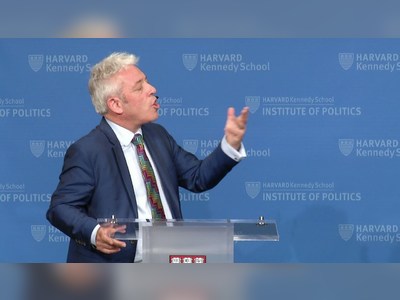British Heritage
Remember, Cherish, Learn.
beta
Winston Churchill - Address To Harrow School, 1941
Instilling Resilience and Hope in Britain's Darkest Hour.
Winston Churchill's potent impact on British heritage resonates through his unwavering leadership during World War II, with his stirring speeches emblematic of his resolve and resilience. A defining moment was his powerful address at his alma mater, Harrow School, on October 29, 1941, in the midst of the war's grim days. Churchill's emphatic exhortation to "Never give in, never, never, never" remains an enduring symbol of British fortitude and resistance.
Born into a family of substantial political lineage, Churchill was not initially seen as a promising student. His school records at Harrow, one of Britain's leading public schools, suggest a less than impressive performance. However, history has since reframed this narrative, recognising Churchill as one of the most influential figures ever to emerge from the British Isles.
The grim backdrop of World War II coloured Churchill's return to Harrow School on October 29, 1941. The traditional songs sung during his visit were poignant, with an additional verse commemorating his leadership:
"Not less we praise in darker days
The leader of our nation,
And Churchill's name shall win acclaim
From each new generation.
For you have power in danger's hour
Our freedom to defend, Sir!
Though long the fight we know that right
Will triumph in the end, Sir!"
His address to the school was a masterstroke of motivation and morale-boosting, a call to resilience in the face of the unmeasured menace of the enemy. While Britain's situation had improved since his last visit, he urged his audience to brace for both short and sharp as well as long and tough battles. Churchill urged patience, resilience, and conviction in the face of adversity, stating, "never give in, never, never, never, never-in nothing, great or small, large or petty."
Churchill's speech provided an inspiring framework for understanding the war's adversity. By changing the term "darker days" to "sterner days" in the newly added verse, he reframed the harsh circumstances as challenges to overcome rather than insurmountable obstacles. He insisted that these were not dark days, but rather "great days — the greatest days our country has ever lived." This optimistic perspective aimed to motivate and inspire, serving as a rallying cry for a nation engaged in a prolonged conflict.
Churchill's 1941 address to Harrow School represents more than an emotional and motivational speech; it encapsulates his indomitable spirit and his ability to inspire hope and resilience in the face of overwhelming adversity. His potent words continue to resonate, embodying a quintessential aspect of British character — unyielding perseverance in the face of adversity.
Churchill’s enduring legacy extends far beyond his leadership during World War II; his life and words have left an indelible mark on British heritage. He transformed the adversity faced during the war into a symbol of national pride and unity, inspiring future generations with his relentless optimism and resilience. As his name continues to win acclaim from each new generation, Churchill's legacy lives on as a beacon of hope, resilience, and unyielding resolve.
Early Life and Education at Harrow School
Born into a family of substantial political lineage, Churchill was not initially seen as a promising student. His school records at Harrow, one of Britain's leading public schools, suggest a less than impressive performance. However, history has since reframed this narrative, recognising Churchill as one of the most influential figures ever to emerge from the British Isles.
The Harrow School Address: "Never Give In, Never, Never, Never, 1941"
The grim backdrop of World War II coloured Churchill's return to Harrow School on October 29, 1941. The traditional songs sung during his visit were poignant, with an additional verse commemorating his leadership:
"Not less we praise in darker days
The leader of our nation,
And Churchill's name shall win acclaim
From each new generation.
For you have power in danger's hour
Our freedom to defend, Sir!
Though long the fight we know that right
Will triumph in the end, Sir!"
His address to the school was a masterstroke of motivation and morale-boosting, a call to resilience in the face of the unmeasured menace of the enemy. While Britain's situation had improved since his last visit, he urged his audience to brace for both short and sharp as well as long and tough battles. Churchill urged patience, resilience, and conviction in the face of adversity, stating, "never give in, never, never, never, never-in nothing, great or small, large or petty."
Lessons in Resilience and the Power of Optimism
Churchill's speech provided an inspiring framework for understanding the war's adversity. By changing the term "darker days" to "sterner days" in the newly added verse, he reframed the harsh circumstances as challenges to overcome rather than insurmountable obstacles. He insisted that these were not dark days, but rather "great days — the greatest days our country has ever lived." This optimistic perspective aimed to motivate and inspire, serving as a rallying cry for a nation engaged in a prolonged conflict.
Churchill's Legacy: A Beacon of Hope and Resilience
Churchill's 1941 address to Harrow School represents more than an emotional and motivational speech; it encapsulates his indomitable spirit and his ability to inspire hope and resilience in the face of overwhelming adversity. His potent words continue to resonate, embodying a quintessential aspect of British character — unyielding perseverance in the face of adversity.
Churchill’s enduring legacy extends far beyond his leadership during World War II; his life and words have left an indelible mark on British heritage. He transformed the adversity faced during the war into a symbol of national pride and unity, inspiring future generations with his relentless optimism and resilience. As his name continues to win acclaim from each new generation, Churchill's legacy lives on as a beacon of hope, resilience, and unyielding resolve.




